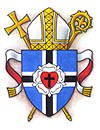 Sermon – Acts 17:24,25
Sermon – Acts 17:24,25
Independence Day, the Anniversary of the Republic of Estonia
24 February 2020, Kaarli Church, Tallinn
Urmas Viilma, Archbishop of the EELC
Thirty years ago, the composer Veljo Tormis, son of a Vigala parish clerk, wrote the choral cycle “Forgotten Peoples”. This work was based on the traditional (runo) songs of six Finno-Ugric peoples: Livonians, Votes, Izhorians, Ingrians, Vepsians, and Karelians. Tormis said that he wrote his composition at a time when these peoples were on the verge of extinction, with some of the languages being spoken only by a couple of individuals. By now, the world has forgotten these peoples.
Today, we celebrate the 102nd anniversary of Estonia’s independent statehood, feeling grateful that Estonian language has not been written into a song out of compassion in a scenario where our small nation is about to disappear from global memory, or our language is close to perishing. Despite all the hardship of the past, Estonians have not become a forgotten people. Therefore, we do not celebrate today merely the past, which is encapsulated in the history of our land and people, but rather the joyful present day of our state, while making grand plans for the Estonia of the future. With God’s help, we are creating a tomorrow for everyone who feels at home on this flat, boggy and forested patch of land, or who has decided to stop here for a shorter or longer period.
One of today’s Biblical passages declares: “The God who made the world and everything in it […] he himself gives to all mortals life and breath and all things” (Acts 17:24,25). As we look around us, we see a people – a multitude of individuals. We see our fellow human beings on the streets, at work and at school, in concert halls and public transportation, at the Song Festival and on hiking trails, in hospitals and shopping centres. But do we really see everyone? Or does our nation, while being rescued from oblivion, still contain those who have been forgotten by their companions? Their life or deeds, appearance or thoughts, opinions or beliefs have taken on a shape – either from birth or as a result of a deliberate choice – that makes others pass them by or look past them. I know from personal experience that feeling when someone, who is actually a good acquaintance, decides to ignore you as if you were invisible. Being invisible can be even more hurtful than being noticed and hated.
How many among us are invisible to others? I am not only talking about pedestrians without a reflector, but rather about those whose opinions or beliefs, lifestyles or deeds, thoughts or words, past or present, appearance or expressions are found unsuitable by many others, or are simply not in fashion at this time. I am talking about the people whose deeds and contributions have been forgotten. Those who have been forgotten by others, either intentionally or inadvertently, out of negligence. And then there are those who have been forgotten in their solitude – in children’s homes, nursing homes or retirement homes. Or even in their own home.
The recognised Estonian songwriter Arne Oit once took a poem by Juhan Saar and wrote the popular song “Ma pean sind südamega kuulama” (I Must Listen to You with My Heart). This love song includes the following words: “I must listen to you with my heart, I must look at you with my heart, I must kiss you with my heart, I must embrace you with my heart”. The exact way how one should go about this is even evident in the feature-length animation film that premiered in Estonian cinemas a week ago; it is based on a children’s story by Eno Raud, in which a rag doll, named Raggie, gets a beating heart. Only young Ruby can hear Raggie’s heartbeats and words, while his older brother Mark, who is already going to school, hears nothing, and the same goes for adults. Ruby listened to her favourite doll with her heart.
If a rag doll, Raggie, can have a beating heart, then can a state also have a heart? Does the church have a heart? We as the people who make up the state and the church do indeed have hearts! We are not rag dolls, and neither are the people around us. Thus, we need to behave accordingly. Our love for our neighbour cannot be limited only to those whom we find convenient and safe to love, because they share our beliefs, mentality and lifestyle, or because they speak the same language, vote for the same political parties or visit the same gym. If the people who are different, or who think differently, are excluded from those whom we should look at and listen to with our hearts, we ourselves will become invisible to the people we are deliberately ignoring. Then we can only encounter each other in social media and, as we make our posts, they come with the hashtag #invisibleperson.
Fortunately, God has eyes for everyone. “And before him no creature is hidden,” (Hebrews 4:13) the Scriptures tell us. The Estonian Council of Churches has devised for the current year the thematic slogan Armastame loodu(s)t (“We love nature/creation”). It emphasises the unity of nature and creation. As we grow in our awareness of the surrounding environmental pollution and waste, we should equally pay positive attention and show our love to all invisible members of society, from their first heartbeat to the last. We should not close our eyes to any human being, be they still in the mother’s womb or on their deathbed. Yet, these two seem to be the very places where the risk of a person being alone, being invisible, is highest.
The present belongs to us, but the future belongs to our children and grandchildren – this is something that many adults like to say. However, we cannot stake a claim on the present as the exclusive property that is reserved to us, adults. Equally, the present belongs to current children and young people. Members of our new generation – be they named Kersti, Jüri, Henn, Mart, Helir-Valdor, Kaja, Indrek or perhaps even Urmas – already share our joys and concerns about the present-day Estonia. I asked the 8th and 9th grade students at the Tallinn Cathedral School to highlight some things for which we have reason to be grateful in Estonia today. What pleases them the most? What makes them sad? I told them that their responses will be included in today’s sermon. I received many responses, indicating that young people are serious about the developments in Estonia and the world. Here are some of the responses from these young people of 14-16 years of age:
I have always felt loved in Estonian society. While we do not know everyone that we encounter on the street in person, we share the same history and same kind of important memories, such as the Song Festival or visiting our grandmothers in the countryside.
I am grateful that I can have a say and that everyone is free to believe and have opinions they think are the right ones.
I often forget what a privilege it is to have a family and a home, because many people do not have the opportunity to return from school to a home where they have a loving family and warm food.
I am happy about our independence and historical experiences.
I would make it so that no retired person feels lonely.
I am grateful for a child’s hopeful laughter that rings throughout the bus.
I am grateful that Estonia offers such a good education, very clean tap water, and that Tallinn has free public transportation.
I would like to see more rubbish bins in the world.
You provided trams with a weirdly functioning WiFi. But it requires someone to make an effort – which is lovely.
Where is my snow?
Children are required to give up their seats on public transport for older passengers simply because it is polite. But perhaps this child is carrying a heavy school bag and deserves the seat as much as the adult. I would like to see that we are all equal, #equallyhuman.
I am grateful for having a free country where liberty was won by our parents singing, not fighting.
I believe that art and creativity are very important for the soul.
I am grateful for a tourist that takes a photo of a lopsided prohibition sign. I am grateful for the mist-covered Old Town and the Toompea hill where you can lose the sense of time. I am happy when footprints on the asphalt are hidden under a fresh layer of snow.
I am very glad that Estonia is, on the global scale, as small as it is. This small size makes Estonia feel like a cosy home and is, in my opinion, something that makes the people more united.
I am happy about the large number of trees that we have. This is why I often go hiking and encourage others to wander around in the nature in order to see how beautiful our country has become because of the many trees.
I very much like Estonian small towns and their natural environment.
It makes me very sad that the seas of the world are full of rubbish and so many animals are dying as a result of our stupidity.
The possibility to learn Estonian language and dialects should be available to everyone.
This is only a brief excerpt of the many dozens of responses from the young people, all honest and intelligent, full of concern and heartfelt joy about Estonia and the world. None of the responses contained bitterness, hostility or hate. There was a lot of hope, care and love.
But our ability to understand the different Estonian dialects will become clear in a moment when we will hear the children’s choir singing in the Võro dialect the beautiful prayer Esä taivan, with music written by Mari Amor and lyrics by Artur Adson. Everyone can use the Estonian translation on the hymn sheet for guidance. The sincere and simple words of this prayer make it clear how important it is for children to be happy in the present moment, in all its simplicity. We have the ability to gift many such happy moments to our children, but also to other people around us. Whether we all stand in the rain or snow, facing the unknown destiny – we can take comfort in the knowledge that it is our shared destiny. Estonia belongs to us all and nobody is invisible. God is invisible. Let us, then, hope and believe that the same God who made the world and everything in it – he himself gives to all equally life and breath and all things (Acts 17:24,25). To large and small, each according to their measure.
Amen.




